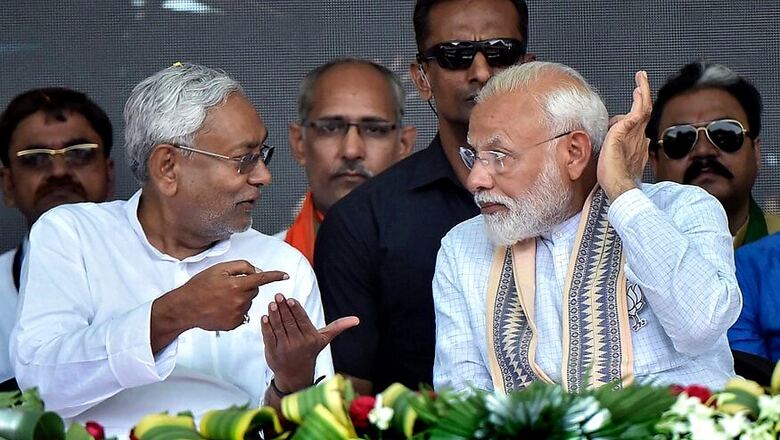
views
The stage is set for a confrontation between the Bharatiya Janata Party (BJP) and Janata Dal United (JDU) as the two allies are bound to wage a political battle against each other in the upcoming assembly elections in mineral-rich Jharkhand.
It is a known stand of the JDU that it will have an alliance with the BJP only at the national level and Bihar, while it will contest elections alone in other states. The purpose behind such a stand is to increase its vote share and thereby achieve the status of a national party.
Ahead of the assembly elections in Jharkhand later this year, the JDU has decided to contest all the 81 seats in the assembly. Party president and Bihar Chief Minister Nitish Kumar, along with the party’s national vice-president and poll strategist Prashant Kishor, held a meeting recently to refurbish the party and gear up for the crucial battle ahead vis-à-vis the BJP.
JDU’s Jharkhand president Salkhan Murmu said the party was looking forward to contesting as many seats as possible, depending on the number of winnable candidates it gets. “We are not averse to contesting all 81 seats in the state if we get as many good candidates,” Murmu said.
The JDU has taken a conscious decision to contest the polls alone because a certain vote share is required by the Election Commission of India to get the status of a national party. “JDU is an independent political party, it has every right to try and increase its voter base and national presence,” said party secretary-general KC Tyagi.
The JDU has been contesting the Jharkhand assembly polls even before the state was carved out of Bihar in November 2000. In the 1995 assembly polls when Bihar and Jharkhand were united, the JDU’s parent outfit — the erstwhile Samata Party — could not win any seat from the South Bihar region, which later became Jharkhand. In the 2000 election, it won five seats from this region.
The Samata Party later merged with the splinter group of the Janata Dal led by Sharad Yadav to become JDU. In the 2005 assembly polls in Jharkhand, the JDU had won six seats out of the 18 it contested. The number came down to two in the 2009 assembly elections when the party contested 14 seats and to naught in the 2014 assembly polls when the party had contested 11 seats.
“JDU has always won a few seats in Jharkhand. The party leadership has realised that its numbers in the state assembly have been consistently declining. The JDU would win only a few seats, but it had a political and electoral presence in Jharkhand, which has slowly diminished. The party leadership wants to revive itself in the state,” Tyagi said.
Among the welter of parties in contention and despite the subtle manoeuvring by them to pull a plank in time for the next electoral joust, the JDU seems to smell an opportunity.
Nitish Kumar is trying to make a ‘considered’ foray into Jharkhand with a careful game plan as the opposition parties, including the Congress and the Jharkhand Mukti Morcha (JMM), are in complete disarray.
Senior JDU leaders believe the party’s alliance with the BJP has caused substantial damage to it as its members largely felt hemmed in by the ‘big brother’ and claimed to have been denied dignity. In the past, its tallest leaders like Inder Singh Namdhari and Radha Krishna Kishore parted ways with the party as they could not find space in state politics.
The JDU’s solitary foray into Jharkhand is based on the premise that it can rope in the support of the politically entrenched and financially rich Kudmi-Mahato caste. However, the caste is culturally and genealogically different than the Kurmis of Bihar. JDU’s past experiment with leaders such as Lalchand Mahato and Jaleshwar Mahato has not yielded the desired political gains.
For the JDU, confronting the BJP in Jharkhand may not be an easy job because the state has been the bastion of the saffron party since long. The BJP would win substantial number of seats in the then Bihar assembly and Lok Sabha elections in South Bihar region, which later became Jharkhand. The BJP wielded such a considerable influence in this region that powerful leaders like Lalu Prasad and JMM leader Shibu Soren could not extirpate it during their heydays.
At present, the Raghubar Das government seems to be stable as it has created a niche on the administrative and development front with the BJP in power at the Centre. However, Das-baiters will like to scuttle the party’s electoral prospects and help the JDU in some region.
Against this backdrop, it seems difficult to predict how much the JDU can hope to cultivate and reap in the Jharkhand assembly polls. But gains in Jharkhand would undoubtedly bolster the image of Nitish Kumar as a national leader.
The JDU has decided to increase its footprint in smaller states by increasing the number of MLAs and percentage of votes to attain the status of a national party by 2020. It will fight elections in the four states of Delhi, Haryana, Jharkhand and Jammu and Kashmir. It is now a recognised party in Bihar and Arunachal Pradesh.
However, the conflict between BJP and JDU in Jharkhand will certainly have its repercussions in the Bihar assembly elections due in 2020. The acrimony is bound to inflict bruises on both the allies and the feeling of hurt may linger during the Bihar polls, which are crucial for the existence of the JDU and Kumar.
(The author is a senior journalist. Views expressed are personal.)




















Comments
0 comment